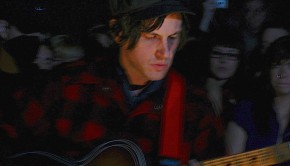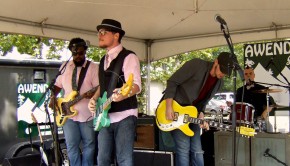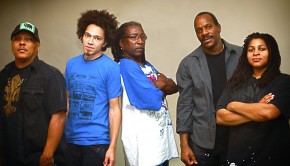Jimmy Herring Wants to Makes His Guitar Sing
North Carolina-born/Atlanta, Ga.-based guitarist Jimmy Herring is a familiar and admired figure in the Southeastern music scene. Critics laud his virtuosic technique and dexterity. Fans embrace his open-minded positivity and sense of camaraderie. At 50, Herring is a Southern legend who’s still excited about expressing himself through all sorts of music, from jazz and blues to orchestral and experimental.
After studying guitar at Berklee College of Music and the Guitar Institute of Technology, Herring went pro in the late 1980s when he helped make a weird splash as a co-founding member of the Georgia-based art-rock/fusion ensemble Col. Bruce Hampton and the Aquarium Rescue Unit. Over the last 20 years, Herring has collaborated with an impressive string of musicians and bands, including Derek Trucks, Kofi Burbridge, Oteil Burbridge, Jazz is Dead, members of the Grateful Dead, members of the Allman Brothers Band, and most recently, as an official member of Athens, Ga.-based jam band Widespread Panic.
Herring and his own backing group — drummer Jeff Sipe, bassist Neal Fountain, and keyboardist Matt Slocum — recently released an instrumental collection of jazzy blues and prog-rock tracks titled Subject To Change Without Notice. This week, Herring steps away from his duties with Widespread Panic to lead his combo through a three-week tour with Grammy Award-winning bassist Victor Wooten (of Béla Fleck and the Flecktones) and his side band. Wooten recently released two solo studio albums on his own imprint Vix — the mostly instrumental Sword & Stone and the song-oriented Words & Tones. Wooten’s touring ensemble includes drummer Derico Watson, bassist Anthony Wellington, bassist/keyboardist/trombonist Steve Bailey, bassist/trumpeter Dave Welsch, and vocalists Krystal Peterson and Kelly Gravely.
The idea behind the Herring/Wooten pairing came together over the summer. Their concert at the Charleston Music Hall on Thurs. Nov. 1 is the kick-off show of the three-week tour. Metronome spoke with Herring this week:
Metronome: This month’s road trip seems like an unexpected partnership between your band and Victor Wooten’s band. Are you excited about the kickoff in Charleston?
Jimmy Herring: Of course, we are very excited about this tour; I’ve been a big fan of Vic’s since I first heard him. He’s in a class by himself, and he’s a classy person on top of that. As a bassist, he’s in another realm altogether. We all jumped at the opportunity to do this.
Metronome: Victor Wooten’s group comes from mostly a jazz/funk background, whereas you and your bandmates are more anchored in blues-rock and fusion. Is there an unusual overlap or weird musical common ground going on?
Jimmy Herring: I would say the blues would be the main place where there’s common ground. Just about all of the music that we’re basing things off of is from the blues, which is the embryo of so many things, from jazz and funk to other American art forms. There’s blues in all of it. Vic’s band is doing something that hasn’t really been done before. I mean, he’s got like four bass players going, you know?
Metronome: Some of the recent press releases for this tour mention the possibility of you all jamming together at different times during the show — and on instruments fans might not expect.
Jimmy Herring: I’m really excited to hear it because everybody in his band is a great musician, but they’ll constantly be switching instruments. People know Vic best as a bass player, but you know he can play any instrument he puts his mind to, so him playing cello doesn’t surprise me a bit. A lot of musicians start out on one instrument and end up on another. Our keyboardist Matt actually teaches violin on the side. Our bassist Neal is a fantastic guitarist. I played saxophone in junior high school … although, I don’t think I’ll pull it out on this tour, unless I want to surpass Vic with how terrible I am on it!
Metronome: The spirit of collaboration and mutual support runs pretty deep for a lot of musicians and fans in the Georgia jam band scene. It seems like the enthusiasm is consistently genuine from both sides.
Jimmy Herring: No doubt about that. All of us feel the same way.
Metronome: Compared to a major tour with a band like Widespread Panic, does a short run like this tour provide a sense of relief or an opportunity to jam without heavy pressure?
Jimmy Herring: Absolutely. It’s a different dynamic, party because of the touring schedule … the traveling conditions for something like this are not quite the same either [laughs]. And that’s not a bad thing at all. But the music itself is different It’s a different flavor. Because there’s no singer in our band, that changes the dynamic quite a bit.
Metronome: It seems like the “singer” ends up being the solo instruments in your music. There’s such a blend of melodies, counterparts, and rhythms on Subject To Change Without Notice, and much of it is quite cinematic.
Jimmy Herring: Yeah, but it’s only the beginning of a new opportunity to go into a new direction musically. A lot of the bands I’ve worked with in the past have fairly hectic touring schedules, so when you’re in a band like that, you don’t really have a whole lot of time to explore other things. These solo records aren’t meant to do anything other than to go into places where I haven’t been able record before. I love cinematic orchestration. That’s why you hear the overdubs and stuff. On the previous record [2008's Lifeboat], we did a cover of a beautiful piece of music from Disney’s The Jungle Book. We don’t have an orchestra at our fingertips, but we do have a bunch of musicians who understand what orchestration is all about. We try to implement that in different ways when we can.
Metronome: Some fans probably like to think that you’ve mastered your instrument, but you always challenge yourself to reach deeper or aim higher as an instrumentalist than before. How have you pushed yourself into new territory as musician in recent years?
Jimmy Herring: I’ve used different approaches over different periods of my life as a musician, I can remember a time when it was all about technique and getting the metronome out and practicing scales and different intervalic movements at high metronome settings. And at another point, it’s about being able to improvise over hairy chord changes where you have a chord progression that’s difficult to play over. And then you might get into soloing over chord changes that are in a different key. That stuff’s hard to do. But at this point in my life, I think about what I consider to be the most amazing instrument of all: the human voice.
Metronome: It’s the notion that great vocalists can deliver melodies with expressiveness just as great instrumentalists can.
Jimmy Herring: Being a musician who plays melodies, I’m naturally drawn to singers who sing melodies. I love Patsy Cline, Loretta Lynn, the Beatles … the list goes on and on. That’s why we’ll cover a George Harrison song here and a Beatles song there. You get a chance to pretend you’re a vocalist. Some people might think, ‘Well, that’s not as hard to play as a Charlie Parker jazz tune,’ but in some ways, it’s harder, you know? At different stages in your development as a musician, you’re drawn to different things.
Metronome: But improvisation is still major part of your band’s performance, right?
Jimmy Herring: Sure, improvisation will always be a part of it, but I think it makes it more special if you don’t do that all night long. Part of the night, you can pretend you’re a singer, and part of the night you can draw from horn players and other musicians. Not just guitar player stuff. I think that should be case with any musician with any instrument — they should listen to other instruments who play other instruments and get inspiration from that. At the end of the day, it’s all just music, whether it’s performed on an oboe or a guitar or the human voice, you know? I want to be a musician. The instrument isn’t more important than the music.
Metronome: The music biz and the critics alongside like to categorize instrumental music like “piano jazz” or “guitar blues.” Does your music fit into a category like those?
Jimmy Herring: My bandmates and I try to look at music as music, no matter what it’s played on. I think that [approach] comes with time. When I was 18, I was just like any other 18 year-old who loved classic rock, and that’s what drew me to the guitar. The guitar is so great because it can play chords, it can play single notes, it can bend notes, and it’s one of the only instruments that can do all of those things and come close emulating the human voice and other instruments. It’s pretty personal in that way, but I don’t think of music coming from a guitar as ‘guitar music.’ I’m 50 years old now, and I’ve been playing guitar for 38 years, and I’ve gone through all sorts of different stages and changes. Anyone who’s done any walk of life for that long is bound to change and grow … hopefully. It’s a journey, and changing and growing is what you want. As musicians, we can keep learning, and it never stops. Music’s infinite. Nobody knows everything. You can keep doing it for a long time. That’s one of the things that’s so beautiful about music.
The Jimmy Herring Band and the Victor Wooten Band share the stage at the Charleston Music Hall at 7 p.m. on Thurs. Nov. 1. Admission is $35. Visit charlestonmusichall.com and jimmyherring.net for more.
Comments
Powered by Facebook Comments







